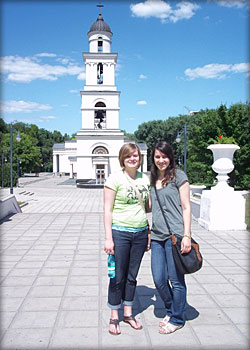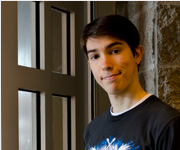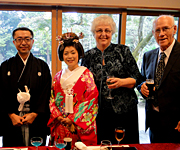Investing in Moldova
by Anonymous

The first recipient of Northwestern’s Moldovan Study Scholarship, Cristina Bodarev, right, met her future roommate, Tara Woodward, last summer while Tara was participating in a Summer of Service with a microfinance organization. They are shown in front of the Cathedral of Christ’s Nativity in Chisinau, Moldova’s capital city.
As a former member of Northwestern’s baseball team, our son visited Moldova several summers ago and came home with a passion for the small Eastern European country that touched our hearts too. He’d learned about microfinance and was enthusiastic about its potential for empowering people who are poor to start their own small businesses. Our son and his baseball coach at the time, Dave Nonnemacher, encouraged my husband and me to visit Moldova and consider how we might become involved.
We didn’t really want to go, but the encouragement just kept coming—from our son, his coach and, I guess, the Holy Spirit. That’s how, one summer, we found ourselves on a trip to one of the poorest countries in Europe, hosted by Invest-Credit, a microfinance organization.
Fifty years of communism have left their mark on Moldova. We stayed in a Soviet efficiency apartment building, where staircases are lit by one dim light bulb and children climb on outdated, rusty playground equipment in dirt courtyards littered with cigarette butts. We strolled through villages where drinking water is drawn from a community well, and corn for livestock is shucked by hand.
We saw desperate young women, willing to be exploited sexually in exchange for a ticket out of Moldova. I was astounded when my husband, noticeably a foreigner, was approached by a woman who said, “I think you are a nice man; I would marry you.”
Abandoned by their Russian rulers after the dissolution of the Soviet Union, Moldovans were left with little resource wealth and barely any knowledge of self-governance. Communism had stripped Moldovans of their self-worth, self-reliance and political wherewithal, creating a profoundly dependent society. In fact, Soviet governance succeeded unusually well in Moldova because a history of subservience already haunted the country. Before communism, Moldovans had rarely experienced the societal stability many of their neighboring countries remembered and yearned for when they won their independence.
Moldova’s last 20 years of post-communism have also been years of hardship. As we met with both political leaders and international investors, it became clear this is still a society in a state of crisis. Members of the older generation long for the sustenance of the iron-fisted Soviet regime, while younger Moldovans have glimpsed the fruits of independence and economic entrepreneurship via their televisions, computers and cell phones.
My husband was intrigued with the question of where development efforts should be focused in this country. Should the first priority be a stable government, a system of transportation, cultivation of Moldova’s fertile soil, or outside investment leading to increased employment? I was captivated by observing the development of a new society both through governance and societal evolution. We wondered what more can be done and how quickly? As visitors from the wealthiest nation on earth, were there roles for us in Moldova’s emergence?
During the months following our trip, these questions fermented and led to others: Could we start by enabling just one Moldovan young person to be educated in ethical business and governing principles—principles he or she could take back to Moldova and put into practice? And could that education happen on a campus filled with diverse, welcoming, trustworthy individuals of high integrity? Could we establish a four-year scholarship that would enable one Moldovan student to graduate from Northwestern, a place we knew would encourage the values Moldova so desperately needs?
Our “Moldovan investment,” Cristina Bodarev, started at Northwestern last fall. She’s a business administration major from the capital city of Chisinau. We trust God is surrounding her with the right people and directing her steps at Northwestern. We pray regularly for Moldova, a country we’ve grown to love, and hope Cristina might impact her country someday in ways we can only imagine.
If you would like to contribute to the Moldovan Study Scholarship established by the writer and her husband, contact Cornie Wassink in the advancement office, 712-707-7109 or corniew@nwciowa.edu.
 Concern about reaching today’s postmodern generation has resulted in a critique of evangelicalism and a new commitment to the message of the gospel.
Concern about reaching today’s postmodern generation has resulted in a critique of evangelicalism and a new commitment to the message of the gospel. When Rick Santorum won the Iowa Republican caucuses in January—and was elevated to the status of Mitt Romney’s main competition—Bob Vander Plaats deserved some of the credit.
When Rick Santorum won the Iowa Republican caucuses in January—and was elevated to the status of Mitt Romney’s main competition—Bob Vander Plaats deserved some of the credit. Head toward the cafeteria, chapel or RSC, and there’s a good chance freshman Paul McCleary will get the door for you.
Head toward the cafeteria, chapel or RSC, and there’s a good chance freshman Paul McCleary will get the door for you. Natsuki Nagakawa became so close to her Northwestern host family that she paid for their trip to her wedding in Japan.
Natsuki Nagakawa became so close to her Northwestern host family that she paid for their trip to her wedding in Japan.
Classic Comments
All comments are moderated and need approval from the moderator before they are posted. Comments that include profanity, or personal attacks, or antisocial behavior such as "spamming" or other inappropriate comments or material will be removed from the site. We will take steps to block users who violate any of our terms of use. You are fully responsible for the content that you post. Comments posted do not reflect the views or values of Northwestern College.